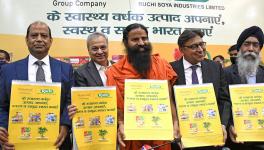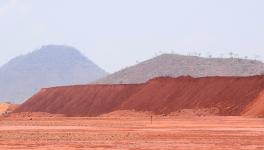Palm Oil: Patanjali Announces Plans for Plantations, Environmental Concerns Loom Large

Image Courtesy: The New Indian Express
As societies grapple with adverse effects of palm oil, globally and particularly in south-east Asia, given the deforestation and the damage that it brings, the 'National Mission on Oilseeds and Oil Palm' was announced by Prime Minister Narendra Mod on Monday. The mission will likely entail investments of Rs 11,000 crore in the “cooking oil ecosystem” and the move is targeted at handling surging imports and food inflation – the Patanjali Group has announed plans of palm oil plantations in India.
Patanjali Group-led Ruchi Soya plans to start palm oil plantations in Assam, Tripura and other north-eastern states. Ramdev announced that surveys had been conducted and that it was a matter of time that plantations take shape. “We plan to set up palm oil plantations in the North-East. We have completed our survey there. We have plans for Assam, Tripura, Meghalaya, Manipur among others,” he said in an interview to PTI. Exact locations are yet to be announced however, with the group also deciding on investing in palm oil plantations in Telangana with a budget of over Rs 700 crore for palm oil-related activities.
As India makes its big palm oil push, experiences from across the world of the destruction caused the industry looms large – large-scale deforestation, extinction of species and disappearing rainforests. Indonesia, which accounts for over 80% of global palm oil production, is now grappling with the enormous challenge of coping with the damage caused by the plants. Africa too is dealing with the inroads the industry has made into the Amazon causing land conflict. Owing to its versatility, palm oil dominates major product industries and the cooking industry. However since it is a mono-culture crop it causes soil degradation, river pollution and affects the overall biodiversity of the region.
In 2014-15, the Centre had launched the National Mission on Oilseeds and Oil Palm (NMOOP), one that ran till 2017-18. However since 2018-19, the mission was being implemented under the National Food Security Mission. Notably, India is dependent on imports of edible oil to meet the domestic demand – palm oil constitutes about 55% of the total imports.
Speaking to Newsclick, Sricharan Behera from the Campaign for Survival and Dignity, said: “The palm oil industry has many dangers and it will affect the biodiversity in the region. Its greatest impact will be on tribal regions. This is also aimed at the corporatisation of natural resources. While the government claims that this is about making India self-reliant, it will destroy the locally-created self-sustaining systems affecting our economy, health and overall biodiversity.”
The slow disappearance of species and the mono-culture nature of palm oil plantations will also affect the biodiversity in the area, leading to even more local species going extinct. There has also been a marked increase in poaching in deforested regions, reports mention,
A major concern with the increasing footprint of the palm oil industry remains the degradation of forest cover as seen across the world. Also, India's push towards palm oil comes at a time when the Centre has diluted many provisions aimed at the protecting forest land and the compensatory afforestation rules.
In May 2019, the government had modified the compensatory afforestation rules. The Centre told the states via an order that states with high forest cover seeking diversion of forest land for non-forestry projects, can now carry out compensatory afforestation in other states. “The guideline notes that states with more than 75 percent of their total land as forests shall not be required to provide non-forest land for compensatory afforestation and this can now be carried out in another state, the Mongabay report noted. The move was seen as one which benefited corporate giants by absolving them of any responsibility towards communities and the ecosystems of the region.
Shillong Tarun Bhartiya, an activist and documentary filmmaker from the North-East, told Newsclick about the effect on tribal land. “The land systems in the North East are based on the notions of commons and land is owned by clans. This will be a move targeted towards a corporate land grab. Moreover, the states being mentioned by Patanjali are in the Sixth Schedule of the Constitution which makes buying land by private parties difficult. However, we have been hearing of private-public partnerships. We have seen examples of failed experiments by the government, such as the generation of biodiesel from Jatropha crops which failed miserably. The key question is: will this lead to similar consequences? Aside from the adverse effects of palm oil, the notion behind this idea is also that tribal communities are underdeveloped and they needed to be integrated into commercial systems," he said.
The move also comes at a time when the government faces flak over easing rules for the import of palm oil. The Centre reportedly reduced the duty on crude palm oil and moved RBD palm olein and RBD palm oil from 'restricted' to the open general category of imports till the end of this year.
Farmers have been demanding a roll-back of the move given the serious repercussions for them, saying that it had exposed the Modi government's claims of self reliance.
Read More: How India Distorts its Own Quest for Self-Reliance in Edible Oils
Get the latest reports & analysis with people's perspective on Protests, movements & deep analytical videos, discussions of the current affairs in your Telegram app. Subscribe to NewsClick's Telegram channel & get Real-Time updates on stories, as they get published on our website.
























